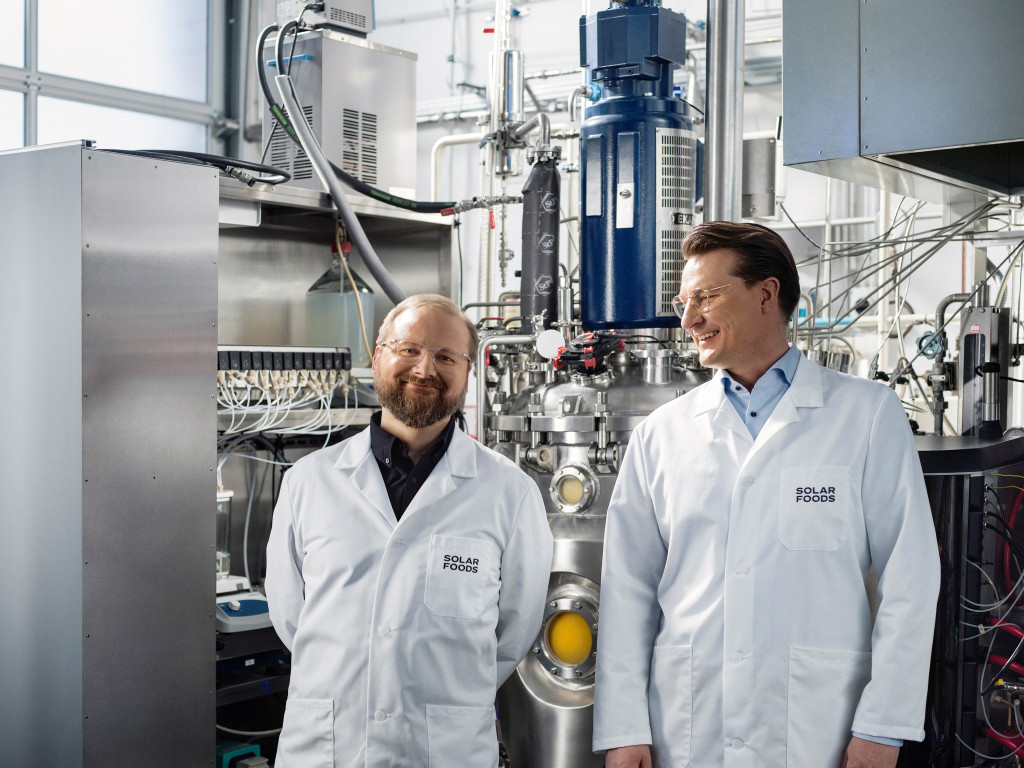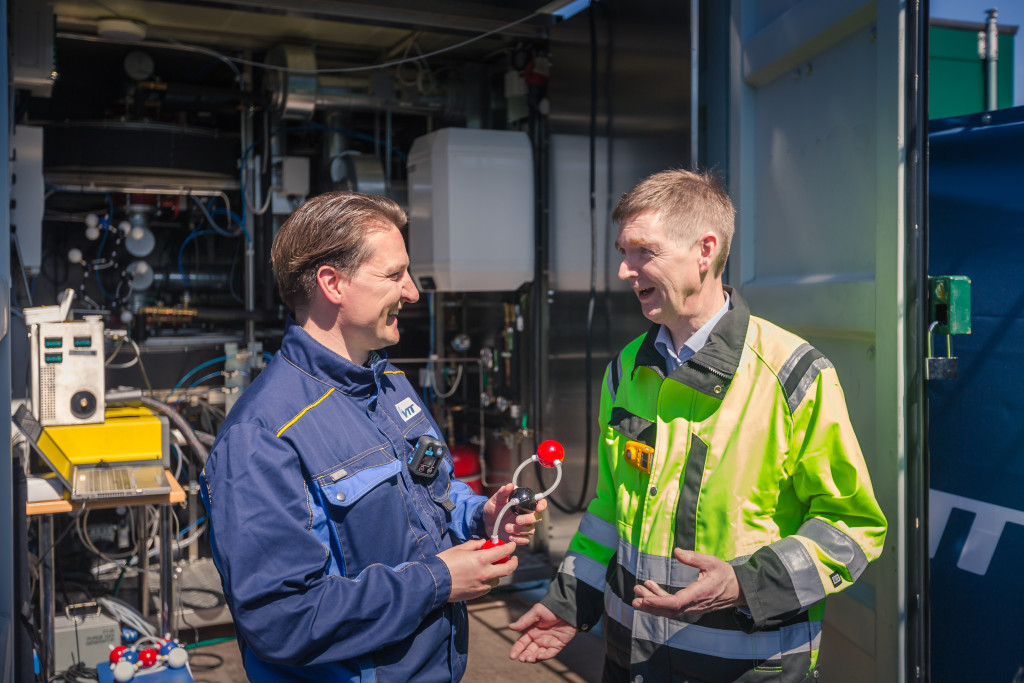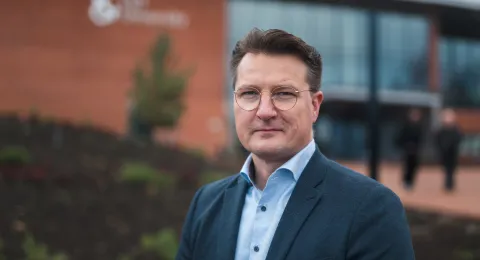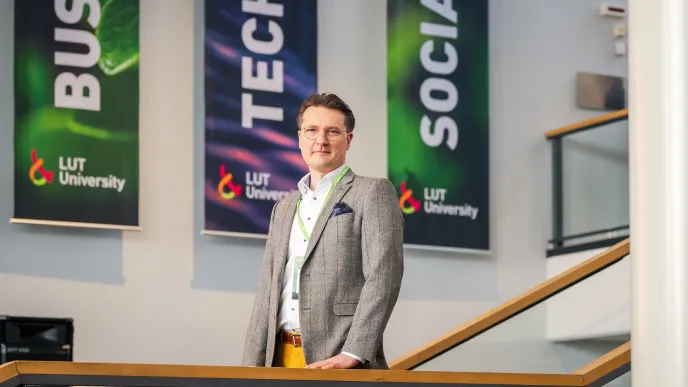The newsletter is your guide to what's happening on LUT campuses and the student community as well as to bachelor's and master's programmes updates and admission instructions.
Photo: Toni Jaatinen
Not many people can brag that their dad makes food out of thin air. Pasi Vainikka’s kids can, and in that sense, one of his biggest dreams has come true. Through his growth company, Vainikka has created something entirely new so that his children – and all children around the world – can look forward to a more sustainable future.
Vainikka is one of the founders of Solar Foods, a company that originated at LUT. He started as a part-time industry professor at LUT in September and intends to challenge outdated ways of thinking during his three-year term. Vainikka wants to promote a way of thinking that will steer Finland’s economical structure into a new direction.
First, he wants to offer young people a path out of negativity. According to Vainikka, a society’s narrative affects everyone and everything, and right now, Finland’s narrative is not very positive.
“The world now resembles a Rubik’s Cube rather than a simple wooden block. In my view, young people’s anxiety stems from an uncertain outlook on the future. I think we at LUT can create a more hopeful mental climate for our students – an attitude that enables them to take initiative and agency.”
Vainikka hopes LUT will influence the broader societal climate as well. Instead of making a single major move, the solution could be a series of smaller actions.
“Students could start building their careers and exploring their strengths alongside their studies. What if we had a university that wasn’t centered on the degree but on building skills, and the degree was just milestone along the way? You get a degree, but above all, an opportunity.”
At its best, LUT could build a reputation so strong that its name alone opens doors for students to found new companies or renew existing ones.
“Someone might decide to study at LUT because it’s always doing something new and exciting. We can all contribute to this new type of narrative. If you can’t find a suitable company to work for, at LUT, you start one yourself.”
As for the role of universities, Vainikka believes Finland’s growth depends on engineering and new technology.
“Where else would it come from if not universities? No one gets to dodge responsibility here. If that stings a little, good – it should.”

Photo: Solar Foods
Second, Vainikka wishes to prompt universities to consider their impact.
The concept of renewal includes the development of new industrial foundations. “The vitality of Finland’s economy is at a historic transition point similar to joining NATO: just as we had to rethink our security policy, we now need to let go of the last remnants of the Soviet-era trade mindset.”
Vainikka points out that recent business success stories have come from younger founders leading companies in sectors that didn’t even exist when his daughters – now in university – were born.
According to Vainikka, these times call for big, bold visions.
“When we’re thinking big and bold, only then can big things happen. Taking on NASA with SpaceX or designing an electric car that BMW or Audi could easily have created first – those are examples of out-there, visionary thinking in pretty conservative industries.”
How do you come up with such visions and audacious ideas?
Vainikka recommends listening to weak signals. In the food industry, for example, it’s essential to follow consumer behaviour, emerging trends, influencers, and social media posts that go viral.
“The market potential for Solar Foods in the U.S. alone is largely untapped. Fourteen million people there already use weight-loss medication, which in turn causes muscle atrophy. A protein-rich yet easy-to-consume product offers one possible solution.”
The weight-loss drugs Vainikka is referring to were approved for weight management only a few years ago; a perfect example of how fast things are changing.
“I hope I didn’t play straight into our competitors’ hands here,” Vainikka laughs.
The best age to start a business
Vainikka says he’s bad at doing the same things over and over. That’s why he never really considered a long career as a basic researcher; he’s always looking for the next big thing.
But what’s the ideal age to start a business?
“Solar Foods was founded when I’d been working at VTT for fifteen years. Our core team was essentially at that family-focused ‘dad’ stage of life – definitely not a young team anymore. A new company can benefit from industry knowledge, fundraising experience, and a founder with a global outlook.”
Vainikka believes a multi-competency approach helps when starting a business.
“A mix of different career stages might be good. Those who already have business experience – including failed ventures – can see things from another angle. Getting fed up with approaches that clearly don’t work, combined with years of experience, can help make better choices.”
Despite the above, experience is not the most important thing, attitude is. If an idea is genuinely new, it’s new to everyone, which puts everyone at an early-stage company on equal footing. A complete lack of work experience, on the other hand, shields you from entrenched thinking that stifles innovation.
“What matters is attitude and the ability to learn. Isn’t that what competence is really made of?”
“In listed companies, there’s plenty of gray hair – including mine – to go around. However, the most significant firms of this century were largely founded by students during casual evenings throwing darts.”

Photo: Solar Foods

Photo: Teemu Leinonen
Example set by others
What about the role of science? A new company can be the crystallisation of long-term dedication to science, or it can acquire scientific results along its journey. The modern economy includes mechanisms that can scale an idea that once seemed silly into a major industrial corporation in just a few years.
Entrepreneurship takes grit and belief in what you’re doing. Vainikka is quick to note that the story of Solar Foods is still in progress – at least from the business perspective.
“We have the opportunity and technology we need, but we haven’t penetrated the market yet. In manufacturing, the ability to manufacture is what matters. We’re still in the process of scaling.”
The reason Vainikka became an entrepreneur was the example set by others.
“I was encouraged by the examples of other entrepreneurs. And my trip to Silicon Valley years back certainly didn’t hurt. I returned with an entrepreneurial mindset and the conviction that I needed to take initiative and have agency. Everything’s impossible until someone does it.”
The inside scoop:
What I regret: “A leader’s job is to set the pace, but I’ve sometimes wondered whether I’ve demanded too much of people or been too inflexible. I could’ve been more patient.”
If I could only have three things: “A boat, Lake Saimaa, and dry socks. I might retreat to an island somewhere, and if I could see an endangered Saimaa ringed seal up close, life would be complete.”
An unforgettable moment: “My doctoral conferment in Turku in 2011 happened to coincide with President Martti Ahtisaari’s visit to the city. Ahtisaari was an honorary doctor of the University of Turku. I mustered up the courage to ask him for an autograph on the inside of my doctoral hat. When Ahtisaari passed away a couple of years ago, we placed a candle and that doctoral hat with the Nobel laureate’s signature on our table at home.”
More information:






